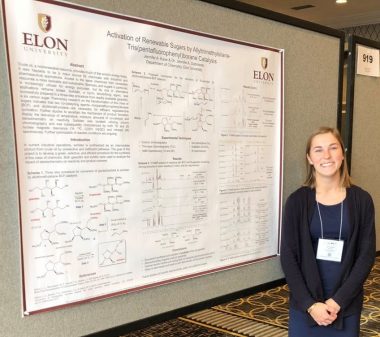SURE student Jenny Kane '18 and Assistant Professor of Chemistry Jen Dabrowski presented their research on conversion of biorenewable resources to fine chemicals at the annual Southeast Regional Meeting of the American Chemical Society (SERMACS) in Charlotte, N.C.
Research conducted in the Dabrowski lab was presented at the 69th annual Southeast Regional American Chemical Society (SERMACS) conference held in Charlotte, N.C., on Nov. 10, 2017.

SERMACS is the preeminent regional meeting for chemists in the southeast established by the American Chemical Society and included the following subdisciplines: analytical, biological, chemical education, computational, inorganic, medicinal, organic, physical and polymer chemistry.
Recently, scientists and consumers alike have begun to take note of the source of chemicals within everyday consumer goods. A major thrust has been to access these from renewable feedstocks. However, significant research is still required to achieve this goal.
Toward this end, Assistant Professor of Chemistry Jen Dabrowski gave an oral presentation entitled, “Delineating The Multiple Roles of B(CF) in the Chemoselective Deoxygenation of Unsaturated Poly-ols.” The research was a collaborative project conducted with researchers at UNC-Chapel Hill to ascertain the fundamental principles behind transformations that convert sugars to precursors of consumer products.
In addition, English major Jenny Kane '18 was selected to present a poster on the research she conducted at Elon over the summer as a recipient of the Summer Undergraduate Research Experience fellowship (SURE). Her work, entitled “Activation of Renewable Sugars by Allyltrimethylsilane-Tris(pentafluorophenyl)borane Catalysis” was a culmination of efforts towards accessing pharmaceutically relevant molecules from renewable resources.
Kane was able to successfully prepare sorbitan, a cyclic emulsifying agent used in lotions, in a three-step procedure from readily available galactitol, a six-carbon sugar. Dabrowski notes, “Jenny is a perfect example of the opportunities for undergraduate research here at Elon. You don’t have to be a chemistry major to make advances in the chemical sciences – all you need is curiosity and a passion to learn.”
Her project was taken over in the fall by Elon College Fellow Tucker Schweikart.


